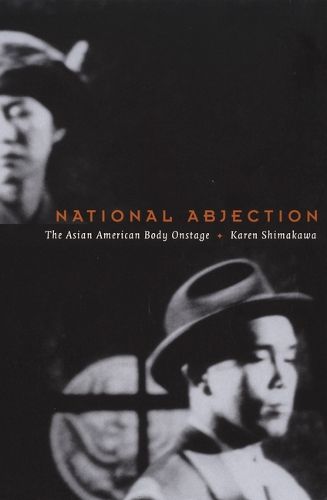Readings Newsletter
Become a Readings Member to make your shopping experience even easier.
Sign in or sign up for free!
You’re not far away from qualifying for FREE standard shipping within Australia
You’ve qualified for FREE standard shipping within Australia
The cart is loading…






National Abjection explores the vexed relationship between Asian Americanness and Americanness through a focus on drama and performance art. Karen Shimakawa argues that the forms of Asian Americanness that appear in U. S. culture are a function of national abjection–a process that demands that Americanness be defined by the exclusion of Asian Americans, who are either cast as symbolic foreigners, incapable of integration or Americanization or distorted into an honorary whiteness. She examines how Asian Americans become culturally visible on and off stage, revealing the ways Asian American theater companies and artists respond to or oppose the cultural implications of this abjection. Shimakawa looks at the origins of Asian American theater, particularly through the memories of some of its pioneers. Her examination of the emergence of Asian American theater companies illuminates their various strategies for countering the stereotypes of Asian Americans and the lack of visibility of Asian American performers within the theater world.She shows how some plays–Wakako Yamauchi’s 12-1-A, Frank Chin’s Chickencoop Chinaman, and The Year of the Dragon–have directly and indirectly addressed the displacement of Asian Americans. She analyzes works attempting to negate the process of abjection–such as the 1988 Broadway production of M. Butterfly–as well as Miss Saigon, a mainstream production that enacted the process of cultural displacement both onstage and off. Finally, Shimakawa considers Asian Americaness in the context of globalization by meditating on the work of Ping Chong, particularly his East-West Quartet. National Abjection will appeal to those in Asian American, American, performance, and cultural studies.
$9.00 standard shipping within Australia
FREE standard shipping within Australia for orders over $100.00
Express & International shipping calculated at checkout
Stock availability can be subject to change without notice. We recommend calling the shop or contacting our online team to check availability of low stock items. Please see our Shopping Online page for more details.
National Abjection explores the vexed relationship between Asian Americanness and Americanness through a focus on drama and performance art. Karen Shimakawa argues that the forms of Asian Americanness that appear in U. S. culture are a function of national abjection–a process that demands that Americanness be defined by the exclusion of Asian Americans, who are either cast as symbolic foreigners, incapable of integration or Americanization or distorted into an honorary whiteness. She examines how Asian Americans become culturally visible on and off stage, revealing the ways Asian American theater companies and artists respond to or oppose the cultural implications of this abjection. Shimakawa looks at the origins of Asian American theater, particularly through the memories of some of its pioneers. Her examination of the emergence of Asian American theater companies illuminates their various strategies for countering the stereotypes of Asian Americans and the lack of visibility of Asian American performers within the theater world.She shows how some plays–Wakako Yamauchi’s 12-1-A, Frank Chin’s Chickencoop Chinaman, and The Year of the Dragon–have directly and indirectly addressed the displacement of Asian Americans. She analyzes works attempting to negate the process of abjection–such as the 1988 Broadway production of M. Butterfly–as well as Miss Saigon, a mainstream production that enacted the process of cultural displacement both onstage and off. Finally, Shimakawa considers Asian Americaness in the context of globalization by meditating on the work of Ping Chong, particularly his East-West Quartet. National Abjection will appeal to those in Asian American, American, performance, and cultural studies.